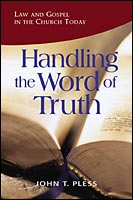26 January 2006
Handling the Word of Truth by John T. Pless
Originally posted on Necessary Roughness on June 9, 2005.
 I ordered Handling the Word of Truth: Law and Gospel in the Church Today by John T. Pless. Others have had good things to say about Pless's other books, so I would try this one.
I ordered Handling the Word of Truth: Law and Gospel in the Church Today by John T. Pless. Others have had good things to say about Pless's other books, so I would try this one.
The book, 128 pages in 13 chapters and an appendix, contains snippets from Martin Luther and C.F.W. Walther, expanded in modern English. Biblical scripture is organized into Old and New Testaments, but intermingled in both are portions of God's law and His Gospel. It is important for a Christian to tell the difference and not mingle the two, because God's Law shows us what we are to do, and the Gospel shows what He has done for us.
If a little Law is mixed in with the Gospel, then the message becomes, "What do we do to earn salvation?" This was a common grievance by Luther of the Roman Catholic Church during the Reformation, and some have mentioned that it is a fault of the theology behind popular books such as The Purpose Driven Life. If some Gospel is mixed in with the Law, then the message becomes "Even though I have broken God's law, the Holy Spirit cannot leave me and I cannot fall into God's wrath." This blunting of sin's condemnation is an objection of some Calvinists by Walther.
Because Lutherans believe that salvation is acquired by no work of man, there has always been the criticism of "cheap grace" or licentiousness. This comes from not understanding the dual nature of God's Word. If one believes the Gospel and has faith in their salvation purchased by Christ, one wants to do good and follow God's law.
Scripture is cited so much in this book that it would have been difficult to read all the references if I didn't have the Bible on PDA. This is a good book for an Adult Sunday School class, where a Pastor can assign the passages in each chapter among a group of people.
This book divulged some interesting things about preaching. C.F.W. Walther taught pastors that when someone is secure in their sin, or secure that they are pious by their own deeds, the Law should be preached to them, to warn them that their security is unwarranted and to inform them of the coming Judgment. After they realize how bad they really are, the Gospel should be preached to them that they may believe and be saved. If Law is preached to the already insecure, a person may despair and think they will never go to heaven. If Gospel is preached to the secure, a person won't take it seriously, and continue unaware of the consequences of their disbelief and error.
Despite the theological heaviness of the issues, Pless writes well and toward the mature Christian. He doesn't use the big words saved for theological academia, like "eschatology" and "exegesis". I do recommend this book for Adult Bible Classes as well as anyone concerned with what is required to gain entry into Heaven. I enjoyed the book and found the book's challenge of perceptions informative.
Highly recommended for those interested in analyzing what is being said from the pulpit.
Feedback
Originally posted on Necessary Roughness on June 9, 2005.
 I ordered Handling the Word of Truth: Law and Gospel in the Church Today by John T. Pless. Others have had good things to say about Pless's other books, so I would try this one.
I ordered Handling the Word of Truth: Law and Gospel in the Church Today by John T. Pless. Others have had good things to say about Pless's other books, so I would try this one.The book, 128 pages in 13 chapters and an appendix, contains snippets from Martin Luther and C.F.W. Walther, expanded in modern English. Biblical scripture is organized into Old and New Testaments, but intermingled in both are portions of God's law and His Gospel. It is important for a Christian to tell the difference and not mingle the two, because God's Law shows us what we are to do, and the Gospel shows what He has done for us.
If a little Law is mixed in with the Gospel, then the message becomes, "What do we do to earn salvation?" This was a common grievance by Luther of the Roman Catholic Church during the Reformation, and some have mentioned that it is a fault of the theology behind popular books such as The Purpose Driven Life. If some Gospel is mixed in with the Law, then the message becomes "Even though I have broken God's law, the Holy Spirit cannot leave me and I cannot fall into God's wrath." This blunting of sin's condemnation is an objection of some Calvinists by Walther.
Because Lutherans believe that salvation is acquired by no work of man, there has always been the criticism of "cheap grace" or licentiousness. This comes from not understanding the dual nature of God's Word. If one believes the Gospel and has faith in their salvation purchased by Christ, one wants to do good and follow God's law.
Scripture is cited so much in this book that it would have been difficult to read all the references if I didn't have the Bible on PDA. This is a good book for an Adult Sunday School class, where a Pastor can assign the passages in each chapter among a group of people.
This book divulged some interesting things about preaching. C.F.W. Walther taught pastors that when someone is secure in their sin, or secure that they are pious by their own deeds, the Law should be preached to them, to warn them that their security is unwarranted and to inform them of the coming Judgment. After they realize how bad they really are, the Gospel should be preached to them that they may believe and be saved. If Law is preached to the already insecure, a person may despair and think they will never go to heaven. If Gospel is preached to the secure, a person won't take it seriously, and continue unaware of the consequences of their disbelief and error.
Despite the theological heaviness of the issues, Pless writes well and toward the mature Christian. He doesn't use the big words saved for theological academia, like "eschatology" and "exegesis". I do recommend this book for Adult Bible Classes as well as anyone concerned with what is required to gain entry into Heaven. I enjoyed the book and found the book's challenge of perceptions informative.
Highly recommended for those interested in analyzing what is being said from the pulpit.
Feedback

